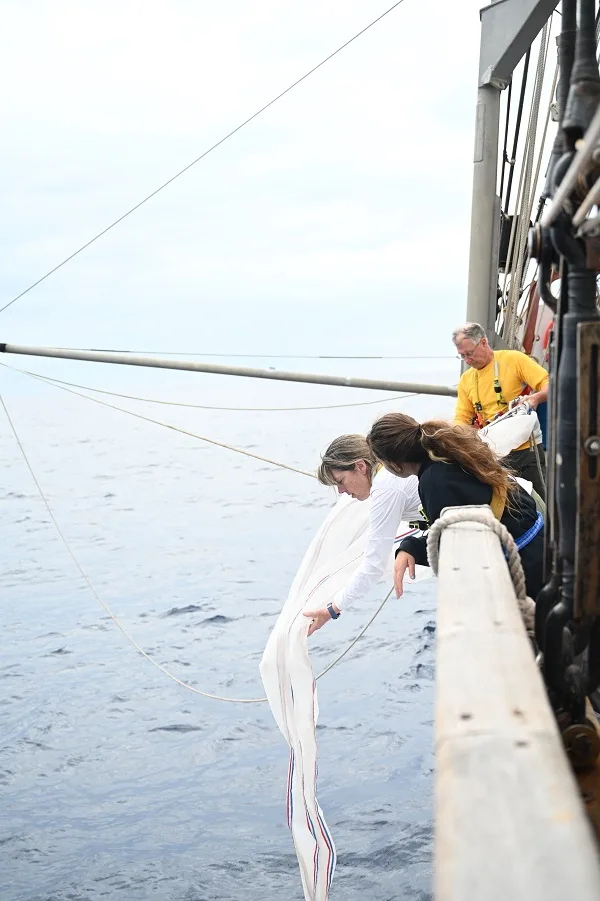Programs Blog
Massachusetts Celebrates its First Right Whale Day

Massachusetts Celebrates its First Right Whale Day
April 24, 2023
Kayla Sheehan
https://sea.edu/wp-content/uploads/2023/04/blog-2a-1.jpghttps://sea.edu/wp-content/uploads/2023/04/blog_2_c.jpg
It was a busy morning on the Cramer, as the crew and participants deployed our first neuston tow of the voyage. Typically, SEA deploys the neuston net for 20 minutes twice a day; however, today’s tow was 5 minutes for the Center for Coastal Studies and under their specifications for sample collection. The samples collected on their behalf will go to a study looking at stable isotopes.
We also had the opportunity to deploy the hydrophone. Though a much quieter landscape than Charleston, SC, there was an occasional deeper hum that was irregular enough that Lindsey thinks it could have been a finback whale. The deployment was recorded for further analysis
Overall, it was a great morning watching our participants and invited experts take part in science deployments. It brought an exciting energy into the afternoon presentations that took place at 1430.
New Bedford Whaling Museum: Bob Rocha, Assistant Curator of Science and Research:
Bob Rocha of New Bedford Whaling Museum kicked off the afternoon to give an overview of right whales and noted the value of dedicating a day to right whales in order to create awareness for the endangered species and the efforts at conservation. Using a small whale model, Bob, showed the audience the lack of dorsal fins, club like flippers, broad tail, and callosity patterns that serve as unique identifiers of right whales
The “Right” Whale name stems from whalers believing they were the “right” whale to hunt. These were based on some assumptions that they were slow moving, offered lots of blubber for oil, were docile, and would float when killed. Historical accounts suggest these assumptions were not always accurate. In the 1840s-1880s right whales were widely hunted resulting in a severe decline of the population. With that being said logs and primary sources seem to focus solely on the southern right whales.
Center for Coastal Studies: Jesse Mechling, Marine Education Director:
For those who think it is too late to pursue your dream career or pursuit, you’ll need to hear directly from Jesse Mechling that it is never too late. Jesse started his presentation sharing just how he came to work for the Center for Coastal Studies and it is not linear.
The Center for Coastal Studies (under a different name) began its right whale studies of habitat and food in Cape Cod Bay in 1984 and is now known for its work on right whales specifically its aerial surveys. Even in 2020, as the world shut down the aerial team after a few weeks continued their work. In recent years, it has become clear that Cape Cod Bay has become the epicenter of North Atlantic Right Whales as it serves as a critical feeding area. In 2022, 80% of the population came to Cape Cod Bay and in the last three years, more moms and calves have been seen entering the bay. Jesse shared that similar to our Neuston tow from earlier in the day, right whales skim feed whereas other baleen whales (rorquals) gulp feed.
You can learn more about the work that the New Bedford Whaling Museum and Center for Coastal Studies do by watching their full presentations.
Full presentations to be uploaded upon voyage completion.
https://sea.edu/wp-content/uploads/2023/04/blog_2_e.jpg
Recent Posts from the Ships
- Ocean Classroom 2024-A collaborative high school program with Proctor Academy
- Collaborations and Long-term Commitments: SEA’s Caribbean Reef Program Sets a Course for Coastal Programs that Compliment Shipboard Experiences.
- Sea Education Association students prepare for life underway using state of the art nautical simulation from Wartsila Corporation.
- SEA Writer 2022, Magazines From the Summer SEA Quest Students
- Technology@SEA: Upgrades Allow Insight into Ocean Depths
Programs
- Gap Year
- Ocean Exploration
- High School
- Science at SEA
- SEA Expedition
- SEAScape
- Pre-College
- Proctor Ocean Classroom
- Protecting the Phoenix Islands
- SPICE
- Stanford@SEA
- Undergraduate
- Climate and Society
- Climate Change and Coastal Resilience
- Coral Reef Conservation
- Marine Biodiversity and Conservation
- MBL
- Ocean Exploration: Plastics
- Ocean Policy: Marine Protected Areas
- Oceans and Climate
- Pacific Reef Expedition
- The Global Ocean: Hawai'i
- The Global Ocean: New Zealand